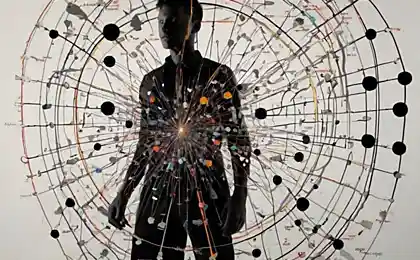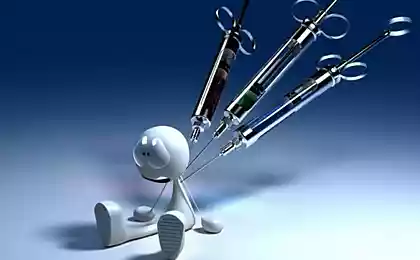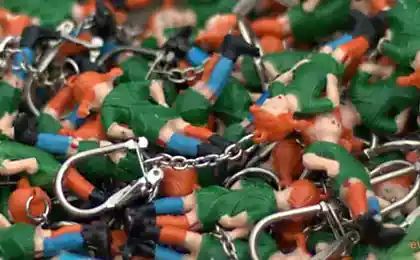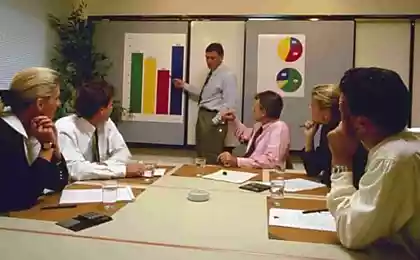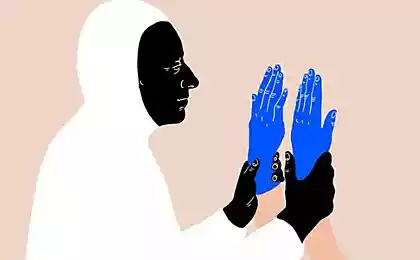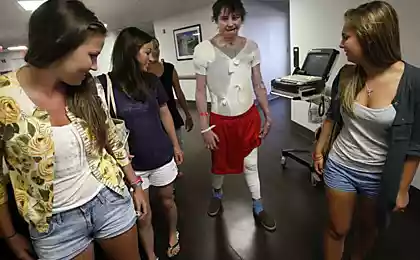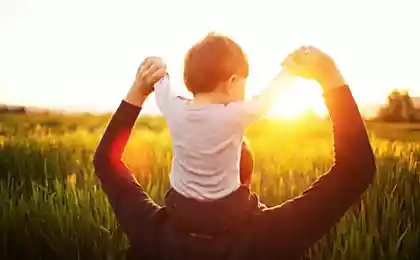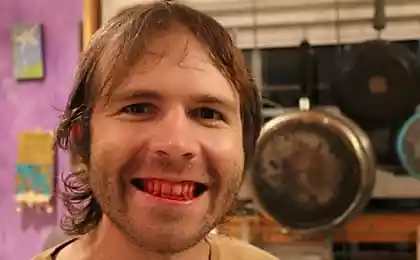482
What determines the viability
Columnist for Big Think Derek Beres talks about how psychologists to study "resilience", along the way explaining what "locus of control" and how it affects our sense of self is why people with well-developed empathy are more resilient, whether the quest for self-knowledge makes us more resistant to the trouble and finally, is it possible to develop resilience?
Most of our troubles begins with language. For example, consider the difference between belief that something is going on with you, and understanding that this is something just happening. This is an additional "you" becomes the basis of catastrophic consequences: depression, insecurity, anxiety, guilt.
At the same time, the other way gives you be aware of the level of personal responsibility, which depends on your freedom.

You can look at it from the other side. When you stand on the 405 (or any other highway), and someone calls you, you will probably say, "I'm stuck in traffic". Occasionally we say "Now I'm stuck", despite the fact that this option is more accurate. As for the person who is behind you, you are a part of the tube, which is ruining his plans.
These seemingly small linguistic nuances lead to serious psychological consequences.
The idea that something happens with us, inflate our ego, as if 4.5 billion years of Earth's history was just so with us, finally, something happened.
But when something just happens, you just take it into account when deciding where to go. You feel involved in the choices being made, without diminishing the eternal cycle of events, involving your limb.
That's where the game takes resilience. In a recent article of the New Yorker magazine ("How People Learn to Become Resilient") Maria Konnikova wrote about a young boy who , as if nothing had happened he went every day to school with a simple bread sandwich meat and condiments were a luxury that his alcoholic mother could not afford (or forgot to put). This boy was part of an experimental group of psychologist Norman of Garmezy, who was researching how resilient children behave in the face of adversity.
Of course, we all know how to endure the blows of fate.
Some people are able to overcome the refugee camps, natural disasters and political revolution — and to get out of these scrapes is not only intact, but stronger. Other limp if no Starbucks they need milk.
You never know what you're made of, before you are faced with a difficult situation.
People often demonstrate the ultimate viability in emergency situations, while annoying boring everyday day-to-day eats them alive. And again, many of us flee or freeze in situations when our parasympathetic nervous system comes to a complete exhaustion.
Writes Konnikova before Garmezy psychologists have paid more attention to what makes them vulnerable patients, and not on what makes them strong. A 32-year longitudinal study conducted in Hawaii and published by Amy Werner in 1989 and further changed the perception of resilience. The results showed that the case, of course, plays a role: the loving mother is the mother-alcoholic, for example. However, describing the research of Werner, Konnikova notes:
"Perhaps — and much more important — resilient children was what psychologists call "internal locus of control".
"Locus of control" — a concept in psychology describing the property of the individual to attribute their successes or failures only internal or only external factors — they believed that they, and not the circumstances that impacted their achievement. Resilient children considered themselves to be conductors of their own fate".
Life is not something that suddenly happened to them; life went on as usual, and they respond to it.

Professor of psychology Richard J. Davidson notes that while in celestials to recover from that adversity need as quickly as possible and that the speed depends on the best result — it can make a person callous.
A lack of empathy develops in those who do not give themselves time to grieve or reflect.
Instead, Davidson suggests meditation mindfulness (in particular, the focus on breathing) as a way of increasing resilience. This could result in slower recovery after the traumatic event. But what is important here is that the personusing the time for contemplation and healing, and does not spend many weeks or months to get bogged down deeper in losses and failures. Davidson also believes that the resilience and the capacity for empathy go hand in hand.
"Part empathetic response — the ability to feel someone else's pain. Indeed, recent studies have shown that when we empathize, the brain aktiviziruyutsya the same neural networks, which aktiviziruyutsya when we ourselves experience pain – physical or that".
Create visual triggers in your home creates a ground for reflection. Davidson offers to post photos of "earthquake and tsunami victims on your fridge" as a potential means for the development of empathy and thus strengthen resilience. However, if you recover slowly, this method can be counterproductive: your sensitivity level is already high. Meditation or training in cognitive reappraisal may give better results.
All of these methods are United by one simple thing —the quest for self-knowledge.
Understanding how our brain works, is one of the most important components of sustainability.
According to the neuroscientist Michael S. Gazzaniga, we often look for freedom in our lives, but the question is: freedom from what?
These concepts have meaning only in social situations; in fact, many of the problems of viability associated with external relations in one way or another. Gazzaniga writes:"the responsibility and the freedom found in the space between brains in interaction between people".
And to strengthen your interactions and your reactions to interactions,take time out each day to reflect and sit quietly and make the world a better place. Every time you step over the threshold of your home, there is the probability of call or strike. You can never fully predict what will happen, but one thing seems clear: that "something" doesn't happen to you. It just happens. And how to treat — you decide. published
P. S. And remember, just changing your mind — together we change the world! ©
Source: monocler.ru/formirivanie-zhiznestoikosti/
Most of our troubles begins with language. For example, consider the difference between belief that something is going on with you, and understanding that this is something just happening. This is an additional "you" becomes the basis of catastrophic consequences: depression, insecurity, anxiety, guilt.
At the same time, the other way gives you be aware of the level of personal responsibility, which depends on your freedom.

You can look at it from the other side. When you stand on the 405 (or any other highway), and someone calls you, you will probably say, "I'm stuck in traffic". Occasionally we say "Now I'm stuck", despite the fact that this option is more accurate. As for the person who is behind you, you are a part of the tube, which is ruining his plans.
These seemingly small linguistic nuances lead to serious psychological consequences.
The idea that something happens with us, inflate our ego, as if 4.5 billion years of Earth's history was just so with us, finally, something happened.
But when something just happens, you just take it into account when deciding where to go. You feel involved in the choices being made, without diminishing the eternal cycle of events, involving your limb.
That's where the game takes resilience. In a recent article of the New Yorker magazine ("How People Learn to Become Resilient") Maria Konnikova wrote about a young boy who , as if nothing had happened he went every day to school with a simple bread sandwich meat and condiments were a luxury that his alcoholic mother could not afford (or forgot to put). This boy was part of an experimental group of psychologist Norman of Garmezy, who was researching how resilient children behave in the face of adversity.
Of course, we all know how to endure the blows of fate.
Some people are able to overcome the refugee camps, natural disasters and political revolution — and to get out of these scrapes is not only intact, but stronger. Other limp if no Starbucks they need milk.
You never know what you're made of, before you are faced with a difficult situation.
People often demonstrate the ultimate viability in emergency situations, while annoying boring everyday day-to-day eats them alive. And again, many of us flee or freeze in situations when our parasympathetic nervous system comes to a complete exhaustion.
Writes Konnikova before Garmezy psychologists have paid more attention to what makes them vulnerable patients, and not on what makes them strong. A 32-year longitudinal study conducted in Hawaii and published by Amy Werner in 1989 and further changed the perception of resilience. The results showed that the case, of course, plays a role: the loving mother is the mother-alcoholic, for example. However, describing the research of Werner, Konnikova notes:
"Perhaps — and much more important — resilient children was what psychologists call "internal locus of control".
"Locus of control" — a concept in psychology describing the property of the individual to attribute their successes or failures only internal or only external factors — they believed that they, and not the circumstances that impacted their achievement. Resilient children considered themselves to be conductors of their own fate".
Life is not something that suddenly happened to them; life went on as usual, and they respond to it.

Professor of psychology Richard J. Davidson notes that while in celestials to recover from that adversity need as quickly as possible and that the speed depends on the best result — it can make a person callous.
A lack of empathy develops in those who do not give themselves time to grieve or reflect.
Instead, Davidson suggests meditation mindfulness (in particular, the focus on breathing) as a way of increasing resilience. This could result in slower recovery after the traumatic event. But what is important here is that the personusing the time for contemplation and healing, and does not spend many weeks or months to get bogged down deeper in losses and failures. Davidson also believes that the resilience and the capacity for empathy go hand in hand.
"Part empathetic response — the ability to feel someone else's pain. Indeed, recent studies have shown that when we empathize, the brain aktiviziruyutsya the same neural networks, which aktiviziruyutsya when we ourselves experience pain – physical or that".
Create visual triggers in your home creates a ground for reflection. Davidson offers to post photos of "earthquake and tsunami victims on your fridge" as a potential means for the development of empathy and thus strengthen resilience. However, if you recover slowly, this method can be counterproductive: your sensitivity level is already high. Meditation or training in cognitive reappraisal may give better results.
All of these methods are United by one simple thing —the quest for self-knowledge.
Understanding how our brain works, is one of the most important components of sustainability.
According to the neuroscientist Michael S. Gazzaniga, we often look for freedom in our lives, but the question is: freedom from what?
These concepts have meaning only in social situations; in fact, many of the problems of viability associated with external relations in one way or another. Gazzaniga writes:"the responsibility and the freedom found in the space between brains in interaction between people".
And to strengthen your interactions and your reactions to interactions,take time out each day to reflect and sit quietly and make the world a better place. Every time you step over the threshold of your home, there is the probability of call or strike. You can never fully predict what will happen, but one thing seems clear: that "something" doesn't happen to you. It just happens. And how to treat — you decide. published
P. S. And remember, just changing your mind — together we change the world! ©
Source: monocler.ru/formirivanie-zhiznestoikosti/
